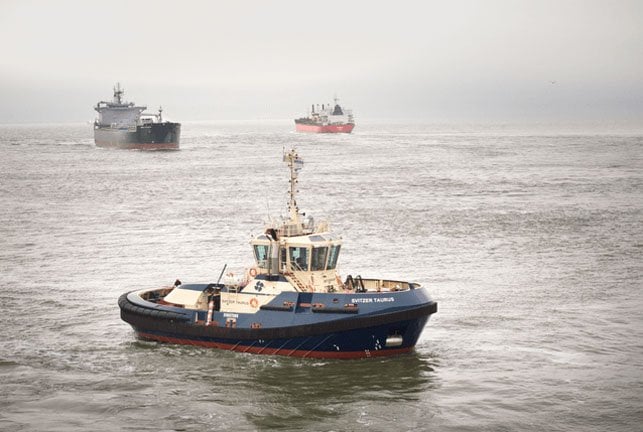Svitzer and Cochin Shipyard to Work on New Generation of Electric Tugs

India’s Cochin Shipyard has secured another major agreement to work with a leading international shipping company. A.P. Moller Holding’s Svitzer becomes the latest company to look to the emerging capabilities, with the agreement announced as India’s Maritime Week 2025 came to a close.
Svitzer and Cochin signed a Letter of Intent to construct a new generation of electric TRAnsverse tugs in India. The companies will collaborate on the plans to build the new electric tugs, which they are calling one of the most advanced and environmentally progressive tug designs. They will, in part, be used to “green” India’s ports and to achieve green towage ambitions.
Svitzer CEO Kasper Nilaus called the agreement part of a “decisive step on our electrification journey.” Svitzer celebrated the commissioning of its first electric tug, Svitzer Ingrid, named by Her Majesty Queen Mary at a ceremony in Copenhagen in September. Svitzer Ingrid has a battery capacity equivalent to that of 23 modern electric cars (1,808 kWh) and can perform approximately 90 percent of tasks using electricity, thereby reducing annual CO2 emissions by 600 to 900 tonnes.
The company, which operates a fleet of over 450 tugboats, noted that it has a second electric tugboat ordered for delivery in 2026. Svitzer has operated four hybrid tugs in Australia since 2016, and said during the September event that it is also in the market for an additional four electric tugboats.
The project with Cochin focuses on the TRAnsverse concept, which they said is known for exceptional maneuverability and efficiency. The design provides precise control in confined water.
The vessels they plan to develop with Cochin are intended for Svitzer’s global fleet renewal and to support growth. They anticipate they will also create the opportunity for a locally built, world-class design to be deployed in Indian ports and terminals.
The project coincides with the Indian government’s plans for port expansion, decarbonization, and the development of the shipbuilding industry. During Maritime Week, the government said to promote green port operations it was launching the Green Tug Programme. It calls for deploying 100 eco-friendly tugs by 2040, with an investment of about ?12,000 crore ($1.3 billion), supporting India’s transition to cleaner and energy-efficient maritime logistics.
Commenting on the agreement with Svitzer, Madhu S Nair, Chairman and Managing Director, Cochin Shipyard Limited, said, “This collaboration will showcase CSL’s world?class capabilities, deepen local supply chains and talent, and accelerate the availability of green, high?performance tugboats for ports at home and abroad.”

that matters most
Get the latest maritime news delivered to your inbox daily.
It is the second major deal for the shipyard in recent weeks with a Western company. CMA CGM announced plans to build six new 1700 TEU dual-fuel LNG containerships built in India with Cochin.
The Indian government seeks to expand its shipbuilding industry to become a player in the international market. Its goal is to be among the top five countries for shipbuilding worldwide by 2047.
